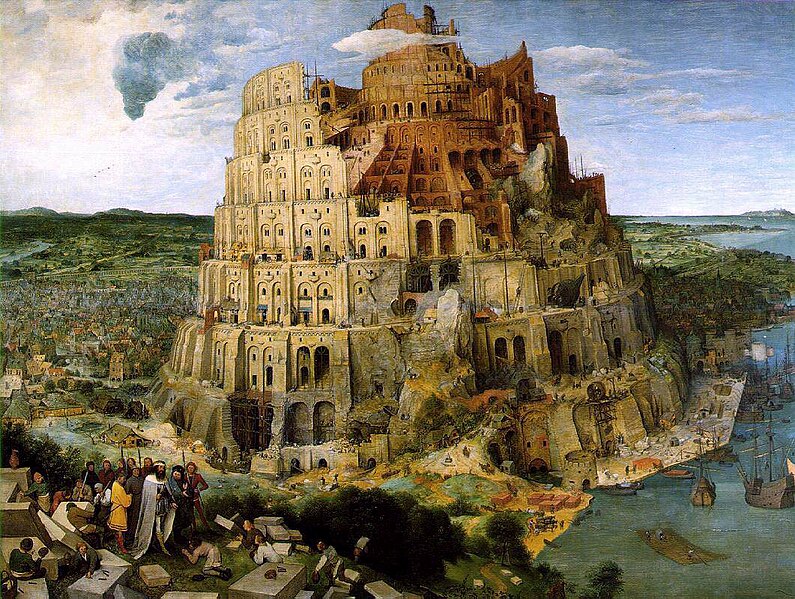Abraham goes into the south country, and once again decides it's best to pass off Sarah as his sister, not his wife. Wait, isn't she something like ninety now? Or is the chronology scrambled? In any case, she catches the eye of Abimelech, the king of Gerar, and he "takes" her -- which I guess means for a concubine. But before any harm can be done, God appears to Abimelech in a dream and tells him he's "a dead man" because "the woman which thou hast taken ... is a man's wife." Abimelech protests that Abraham said she was his sister, and Sarah confirmed it. God admits that Abimelech has been lied to a little, and says that he actually prevented Abimelech from having sex with Sarah before he could tell him the truth. (An advantage he didn't give to Pharaoh, who suffered plagues for it.) So if Abimilech will just send Sarah back to Abraham, who is "a prophet" and will pray for him, God won't kill Abimelech.
Okay, says Abimelech, but when he takes Sarah back to Abraham, he asks why he lied to him and almost got him killed. Abraham says, "Because I thought, Surely the fear of God is not in this place; and they will slay me for my wife's sake." Anyway, he goes on, he wasn't really lying: Sarah is his half-sister, "the daughter of my father, but not the daughter of my mother."
Abimelech is satisfied with the explanation, and not only gives Sarah back to Abraham, he also gives him "sheep, and oxen, and menservants, and womenservants," as well as "a thousand pieces of silver," and tells him to stay on in his land "where it pleaseth thee." In return, Abraham prays to God, who cures the infertility of Abimelech, and his wife, and his maidservants; and they bare children." (The infertility is a detail that the narrator seems to have forgotten to mention earlier.)
Chapter 21
God cures Sarah's infertility, too, and she presents Abraham with a son whom, according to the agreement, he calls Isaac. Abraham is a hundred years old when Isaac is born, and he has Isaac circumcised when the infant is eight days old. "And Sarah said, God hath made me to laugh, so that all that hear will laugh with me." (Sarah seems to be the first person in the Bible with a sense of humor, or perhaps just something to laugh about.)
On the other hand, now that she's produced an heir for Abraham, Sarah gets kind of pissy about Hagar and Ishmael, and tells Abraham to get rid of them.
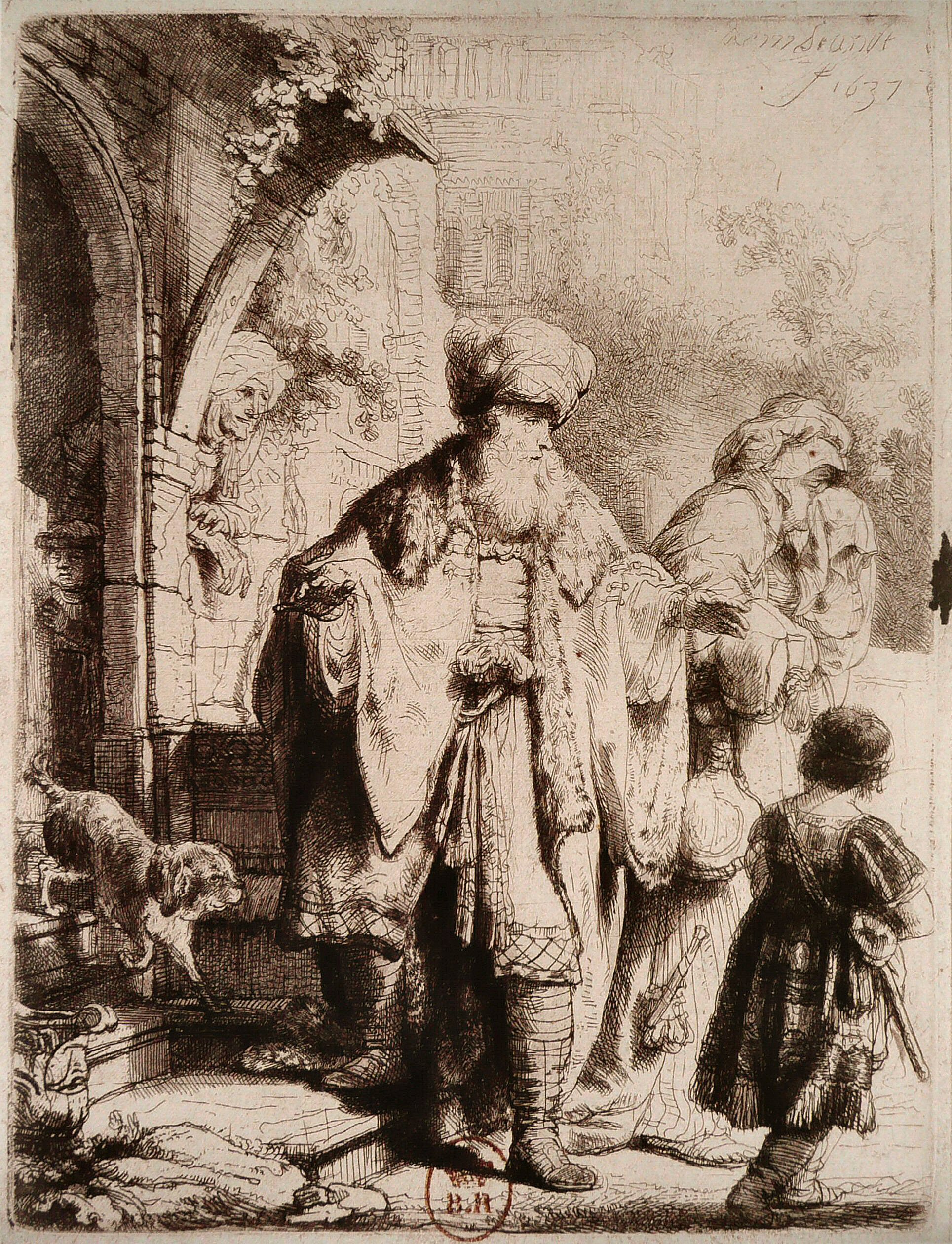 |
| Rembrandt, The Dismissal of Hagar, 1637 |
And God was with the lad; and he grew, and dwelt in the wilderness, and became an archer.Meanwhile, Abraham and Abimelech are having a little quarrel because one of Abimelech's servants "had violently taken away" one of the wells Abraham was using. Abimelech says this is the first he's heard of it, and Abraham should have spoken up before. They patch things up when Abraham gives Abimelech "sheep and oxen," as well as "seven ewe lambs" which signify that Abraham had the well dug himself. So they make a covenant, and Abimelech leaves Abraham alone. "And Abraham sojourned in the Philistines' land many days."
And he dwelt in the wilderness of Paran: and his mother took him a wife out of the land of Egypt.
Chapter 22
Now God decides to "tempt" Abraham: "Take now thy son, thine only son Isaac, whom thou lovest, and get thee into the land of Moriah; and offer him there for a burnt offering upon one of the mountains which I will tell thee of." The narrator doesn't say anything about protesting or questioning this grisly order, but just that Abraham leaves the next morning, taking two young men and Isaac and some firewood with him. Three days later, Abraham sights the place "afar off," and tells the young men to stay there and he and Isaac will go on. He gives Isaac the wood to carry, while he takes the torch and a knife.
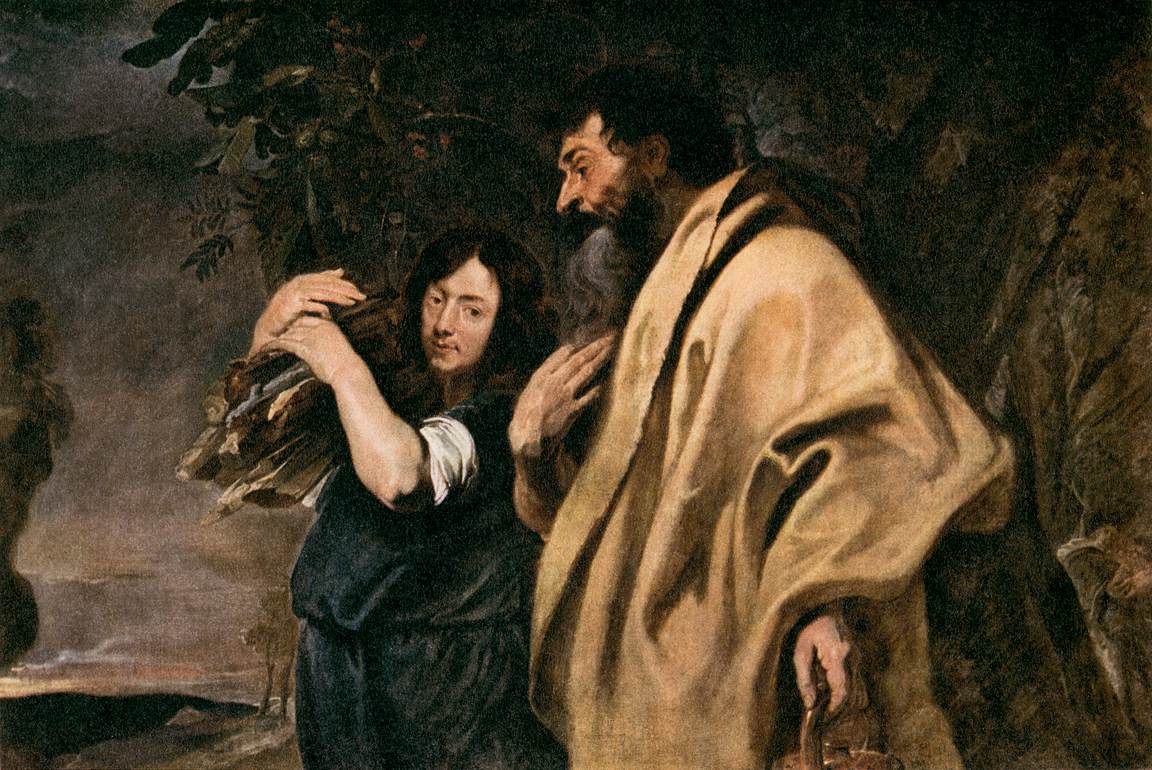 |
| Anthony van Dyck, Abraham and Isaac, c. 1617 |
But when he gets the knife ready to kill Isaac, an angel calls out from heaven: "Lay not thine hand upon the lad, neither do thou any thing unto him; for now I know that thou fearest God, seeing thou has not withheld thy son, thine only son from me."
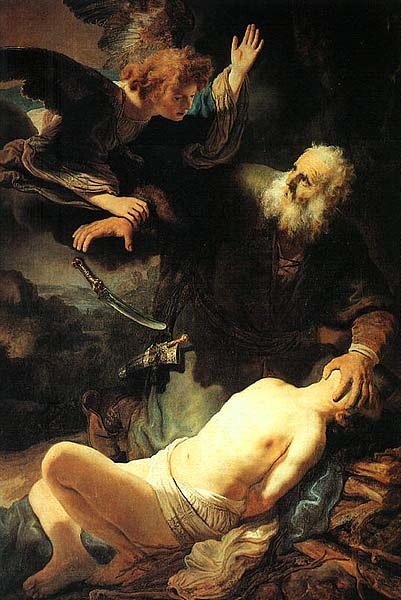 |
| Rembrandt, The Sacrifice of Abraham, 1635 |
That in blessing I will bless thee, and in multiplying I will multiply thy seed as the stars of the heaven, and as the sand which is upon the sea short; and thy seed shall possess the gate of his enemies;There is something profoundly unpleasant about God's putting Abraham (not to mention Isaac!) through this ordeal. The preoccupation with foreskins was bad enough, and the dietary and other restriction to come are annoying, but this borders on sadism. But I'll leave Kierkegaard to wrangle with the implications of this fable.
And in thy seed shall all the nations of the earth be blessed; because thou hast obeyed my voice.
Meanwhile, Abraham's brother Nahor and his wife Milcah have been having children, and one of them, Bethuel, has become father to Rebekah.
Chapter 23
Sarah lives to be one hundred twenty-seven. When she dies in Hebron, Abraham asks for "a buryingplace." Ephron the Hittite says he has a field with a cave in it, and offers it to Abraham, who pays him four hundred shekels of silver for it.
Chapter 24
Getting old, Abraham tells "his eldest servant of his house, ... Put, I pray thee, thy hand under my thigh." He wants him to swear not to find a wife for Isaac among the Canaanites, but to go to the land of his kindred and find a wife for him there. The servant swears he will do it, and goes off to Mesopotamia and the city of Nahor. When he gets there, he makes his camels kneel by the well where the women of the city come to fetch water, and asks God to "let it come to pass, that the damsel to whom I shall say, Let down thy pitcher, I pray thee, that I may drink; and she shall say, Drink, and I will give thy camels drink also: let the same be she that thou hast appointed for thy servant Isaac."
And sure enough, "before he had done speaking," Rebekah, who is Abraham's grand-niece, comes out with her pitcher, answers his request for water, and volunteers to water his camels, too. "And the man wondering at her held his peace, to wit whether the LORD had made his journey prosperous or not." After she has finished watering the camels, he gives her a golden earring and two gold bracelets and asks who her father is, and if he has a room for him to stay in. She says she's the daughter of Bethuel, the son of Micah and Nahor. The servant marvels that the Lord has led him "to the house of my master's brethren."
Rebekah runs home and tells her brother Laban what has happened, and Laban comes out to meet the man, who is standing at the well with his camels. He invites him in to eat, but the servant says he has to explain his errand first: He is Abraham's servant, and Abraham has become a rich man. Abraham's wife, Sarah, he explains, gave birth to a son when she was very old, and Abraham has made the servant swear not to find a wife for the son among the Canaanites in whose land he lives. Instead, he has sent the servant to find a wife for him among his kindred.
He explains further that if he can't find a woman willing to return with him and marry Isaac, that he's released from the oath he swore to Abraham. But he also tells about his prayer for a sign, that the woman he asks for a drink will give it to him and water the camels too, and that Rebekah has done all of that. So Laban and Bethuel agree that this is a pretty good indication that Rebekah fits the bell, and they say, "Behold, Rebekah is before thee, take her, and go, and let her be thy master's son's wife, as the LORD hath spoken."
So after some praying and feasting and exchanging gifts, he's ready to return to Abraham with Rebekah. Her brother and mother want a few days, "at the least ten," more with Rebekah, but the servant asks them not to hinder him. So they ask Rebekah, "Wilt thou go with this man? And she said, I will go."
And they blessed Rebekah, and said unto her, Thou art our sister, be thou the mother of thousands of millions, and let thy seed possess the gate of those which hate them.So off they go.
When they get near where Isaac is living, he sees them coming. She seeks him, too, and gets off her camel, having asked the servant who the man coming through the field to meet them is. When he says it is his master, she puts on a veil. The servant tells Isaac the story, and Isaac takes Rebekah into the tent that had been Sarah's, "and she became his wife; and he loved her: and Isaac was comforted after his mother's death."
Chapter 25
Abraham takes another wife, Keturah, after Sarah's death. She bears him a bunch of children, but "Abraham gave all that he had unto Isaac." He gives gifts to the sons of his concubines, but he sends them away from Isaac. Abraham dies at the age of one hundred seventy-five, and is buried in the same field where Sarah is buried. Ishmael fathers twelve sons before he dies at one hundred thirty-seven.
Isaac is forty when he marries Rebekah, but she is barren until he prays to the Lord. She gets pregnant with twins, who "struggled together within her." She asks the Lord what is going on, and he tells her, "Two nations are in thy womb, and two manner of people shall be separated from thy bowels; and the one people shall be stronger than the other people; and the elder shall serve the younger.
When they are born, the first one is red and hairy, and they name him Esau. The other comes out holding on to Esau's heel, and is named Jacob. Isaac is sixty years old when they are born. Esau becomes "a cunning hunter, a man of the field, whereas Jacob is "a plain man, dwelling in tents." Isaac loves Esau, "because he did eat of his venison," but Rebekah favors Jacob.
Jacob makes some pottage, and when Esau comes in from working the field, he is famished. He asks Jacob for some of the pottage, and Jacob says, "Sell me this day thy birthright." Esau is too hungry to be concerned about any old birthright, and so he sells it to Jacob, who "gave Esau bread and pottage of lentiles; and he did eat and drink, and rose up, and went his way: thus Esau despised his birthright."
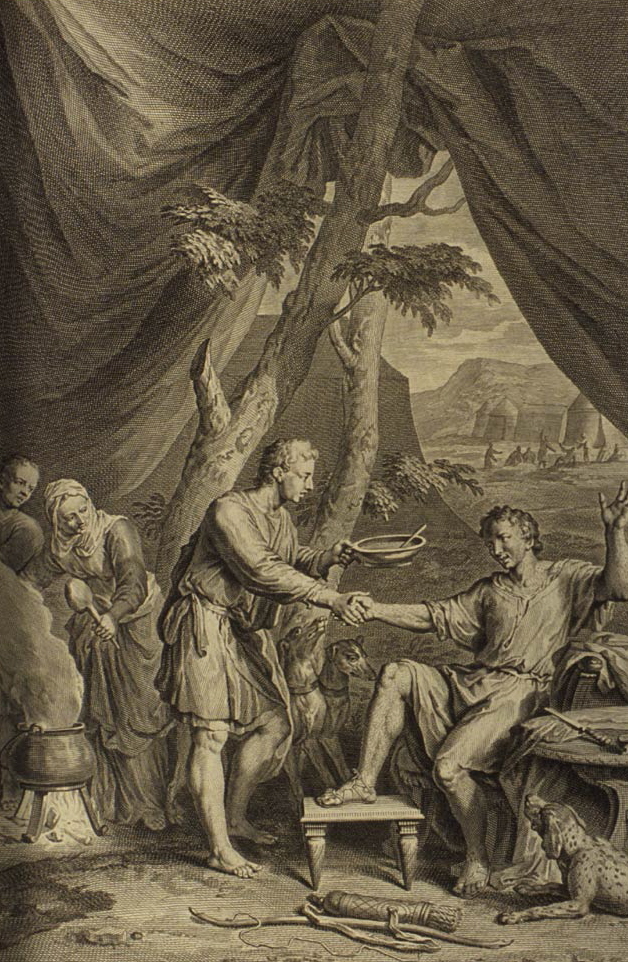 |
| Gerard Hoet, Esau Sells His Birthright for Pottage of Lentils, 1728 |
